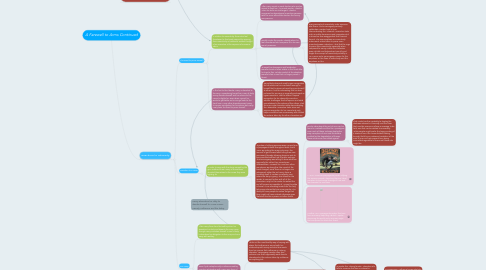
1. Connects to Duty and Obligations section
2. Reactions to adversity
2.1. The need to prove oneself
2.1.1. In relation to masculinity, those who feel threatened in this book respond by proving their masculinity in traditional actions thought of as masculine at the expense of someone else's.
2.1.1.1. After Henry meets 3 meek doctors who are too scared to treat him , he meets Doctor Valentini. When his skills are challenged, Valentini compares his stereotypical masculine persona with the more effeminate doctors that Henry saw previous.
2.1.1.2. Rinaldi mocks the priest's chastity when he feels threatened and compares it to his own sexual prowness.
2.1.1.2.1. Every example of masculinity costs someone else theirs. While Hemingway certainly celebrates a certain kind of man (demonstrating the "classical" masculine traits such as virility, dominance and competence) it is almost so over-exaggerated that it seems farcical. The over-emphasis on masculinity makes each action taken to prove one's masculinity seem ridiculous. I find that the urge to prove their masculinity, especially when compared to Henry, makes the characters seem childish and helps show how silly and fragile the concept of masculinity actually is. I'm curious as to Hemingway's reason for the emphasis on the flaws of masculinity and the emphasis on this.
2.1.1.3. To assert his dominance and leadership, Bonello shoots a fallen soldier in the head after he tries to flee. To take control of the situation, Bonello killed a man that no longer posed a threat.
2.1.2. In the first to third books, Henry is devoted to the army. Considering himself as a man of duty, Henry devotes himself and his actions to the cause he fights for. Even when injured, he wants to get better so he can go back to the front lines. Many other characters want Henry to receive recognition for his actions but Henry rarely feels the need to prove himself.
2.1.2.1. Henry likely does not need to gain recognition for his actions as he is confident enough in himself that he does not need to prove himself to others. I find this interesting that he does not need to, as Henry is originally portrayed as hyper-masculine. That he doesn't require recognition for his classically masculine actions, challenges this first opinion and adds connotations to the actions of the others. That the main male character, while demonstrating the "desirable" masculine traits, does not require recognition for his masculinity only helps re-enforce how unnecessary and childish the actions taken by the other characters are
2.2. Devotion to a cause
2.2.1. in order to cope with the stress caused by the grim realities of war, many of the soldiers devoted themselves to the cause they were fighting for
2.2.1.1. The idea of vilifying enemies wass a major form of propaganda used throughout both World Wars. By making the enemy inhuman, the amount of guilt caused after killing them was minimized; thereby allowing atrocious acts to be committed without risk of public outrage. That Hemingway was willing to show what war was really like rather than romanticize, differentiates A Farewell to Arms from other war stories. By doing this, the mood of the book changes; since there is no longer one antagonist, rather the evil Henry faces is humanity itself, it creates uncertainty over where the story is going. This allows for the reader to connect further with all of the characters, only for the reader to realize tthe evil all humans are capable of. I enjoy this style of novel. It is a refreshing break from the fairy tale-esque stories that are more popular. The ability to force people to realize things that they might not have noticed otherwise gives literature like this a power not often found.
2.2.1.1.1. Similar ideas about the evil of man can be found in Macbeth and the film Apocalypse Now. Each of these 3 stories display the easy corruption of man and the actions justified by the degradation of thoses these actions are committed against.
2.2.1.1.2. A WW1 American propaganda poster vilifying the German people, depicting them as literal monsters to encourage feelings of hate and fear towards the Germans.
2.2.1.1.3. Another WW1 propaganda poster, this time from Germany, depicting a British "spider" devouring the world and a German eagle that was posed to attack this threat.
2.3. Run away
2.3.1. After Henry flees from the battle police, he abandons his duty and deserts the army. Even though Henry considers himself a man of duty, h abandons his obligation to the army and runs away with Barkley.
2.3.2. Even if just metaphorically, Catherine Barkley uses her relationship with Henry as a form of escapism during the first two books. By pretending that the relationship was just a game, she was able to distract herself from the horrors of her job and instead enjoy the time she spends with Henry.
2.3.2.1. While not the most healthy way of coping with stress, that Catherine is secure both her relationship with Henry and what she wants from him proves that Catherine is a strong character. Hemingway's works often face criticism over their supposedly weak female characters but the actions taken by Catherine are anything but.
2.3.2.2. You don't have to pretend you love me. That's over for the evening...and you play it as well as you know how. But its a rotten game.
2.3.2.2.1. The quote shows that Catherine is comfortable in her decision to play this game with Henry. By stating that she knowingly enters this relationship including all that it entails, Catherine is depicted as a strong female character. Many people seem confused about this, but a woman does not need to act like a "male" character or a robot to have worth. In relation to Catherine, by making her own decisions and being confident in her self-worth, she proves her strength and value to the book.
